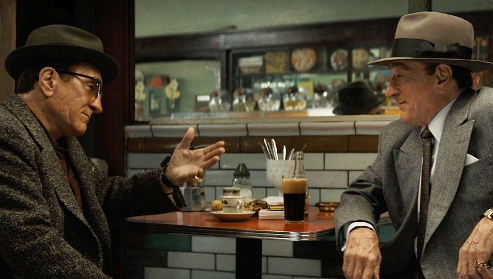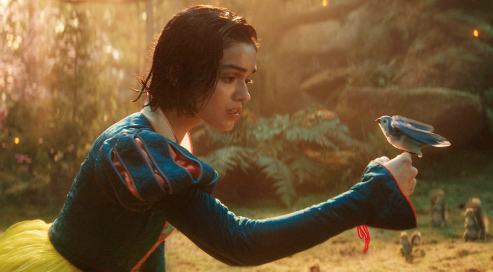THE ALTO KNIGHTS

Cast: Robert De Niro, Debra Messing, Kathrine Narducci, Michael Rispoli, Cosmo Jarvis, Wallace Langham
Director: Barry Levinson
Running Time: 2:03
The Alto Knights seems unassailable is a gangster outing starring Robert De Niro and made by other people who are no strangers to this particular genre, including screenwriter Nicholas Pileggi, an author responsible for some of the most influential books on the subject which inspired some of the great films about the mob. De Niro plays dual roles in this as both Frank Costello, a professional gambler who was the boss of bosses amongst New York City's mafia groups, and Vitto Genovese, another gangster who feuds with his old friend Costello over control of the criminal operations of the city. Despite all of this, the film ends up being two hours of characters, either saying exactly what's happening. or talking around it and looking as if they'd rather be anywhere else - with a narrative that randomly jumps through time, in order for past versions of the characters to explain what the present ones already have, and barely scratches the surface of why this battle between old pals is significant in any way. It's merely an outline of a mob flick, made with no apparent passion or, for that matter, interest in the subject.
It opens in 1957, with an even older Frank narrating with the kind of indecision that will quickly define the dialogue throughout the piece. After a night out at the Copacabana with his wife Bobbie (Debra Messing), Frank returns alone to the building where the two live, for some business. As he stares at the lift, a man enters, raises a pistol, and shoots Frank in the head. The editing of this sequence alone is a nightmare of spatial incoherence, and adding to the temporal disjointedness that comes to define a large chunk of the film, we get to watch it all over again at least once and with even more confusion inserted into the flashback. Frank survives and, knowing that his ambitious friend Vito is responsible for the assassination attempt, decides to retire, lest their dispute spread throughout the city. For the viewers’ benefit, it’s fairly easy to tell Frank and Vito apart, even though De Niro plays both of them. Frank's the one with the prosthetic nose, and Vito is the one who sounds as if he's inhaled a full balloon of helium before each take. To be fair, watching De Niro verbally spar with himself in a couple of scenes is certainly interesting, because the split-screen effect is seamless and the actor can play these kinds of roles in his sleep.
He might however, wish he’d been napping when the offer for this film arrived. From that introduction, the story jumps back into the past, to tangentially and hastily explain that Frank took over as mafia boss after Vito fled to Italy to avoid a double-murder charge, and further into the past, to show them as young men being friendly, and to an older Frank looking right at the camera to tell us what we're watching or just saw a few minutes prior. A sequence like that might happen within a minute or two, by the way, and the rush of so much repeatedly empty storytelling is almost impressive. The rest of the story, for what it's worth, hits all the usual highlights and only the basics. Vito is insulted by Frank's no-show at a party for his return and sends assassin Vincent (Cosmo Jarvis) after him. Frank tells his wife that he's going to retire and wants to make things right with Vito. The other bosses argue about what should be done about Vito. People are killed, and throughout all of this, Frank tells several other people that he still wants to retire and make things right with his old pal. Everyone talks and talks some more, without much flair or about anything other than what we need to know and what, presumably, they already know. The Alto Knights is only about itself as the broad notion of what a gangster film is, while offering no personality, insight, or basic narrative competence to exist as more than the mere idea of a project.

Cast: Rachel Zegler, Gal Gadot, Andrew Burnap
Director: Marc Webb
109 mins
I don’t actually know how to judge these live-action Disney remakes on any relative scale of quality as the bar is so low, and what people seem to want from them — a tickle of nostalgia, the familiar rendered new on a technicality, 109 minutes of child-friendly distraction — feels so different from the usual standards. So: Snow White is not as bad as it could be, while not being anywhere near as good. It’s garishly ugly and padded out with new tunes that are smooth and unremarkable, all of which may or may not matter to its target audience, who could just be basing their decision about whether to see the film on how unacceptably woke social media has informed them it is.
The shortcomings of Snow White — which was directed by The Amazing Spider-Man’s Marc Webb and written by The Girl on the Train’s Erin Cressida Wilson — aren’t on star Rachel Zegler, who communes well with CGI animals by belting out the chorus of the remake’s newly added “I Wish” song. The character dithers about how to fight back against the fascist takeover of her kingdom by her stepmother, the Evil Queen, played by Gal Gadot in a glittery wimple and a performance that’s incredibly stilted. Snow White’s father is gone, his fate uncertain, and she dithers about the castle in a demoted role, fretting about how her people are suffering outside. Snow White is an institutionalist, pining for the idealised era of her father’s leadership, when her family would make apple pies so the working classes could have a small taste of luxury, and unable to conceive of a way to fight the Queen, who may be flashy but who also came into power via the standard methods of marriage and magic.
Snow White eschews violence and gets sniffy about property for someone who’ll later let herself into the home of the septet of vertically challenged persons of a male persuasion, scolding her future love interest, Jonathan (Andrew Burnap), when she discovers him stealing food from the royal kitchen. In this revamp, Jonathan is not a prince but a rebel leading a group of bandits who hide out, Merry Men style, in the forest. Thanks to these plot changes, Snow White doesn’t include one of the animated original’s most famous songs, “Someday My Prince Will Come,” instead opting for a new tune where Jonathan taunts Snow White about her “princess problems.” It’s a tale as old as time — a sheltered girl meets a rakish dirtbag leftist who lives with a bunch of room-mates and who radicalises her by nagging about her privilege. What’s left for a girl to do but attempt some coalition building among a ragtag crew that includes her tiny hosts. As Snow White pleads to her bickering would-be allies, all the Evil Queen wants is for them to fight among themselves while she sits on her throne room, scoffing caviar and, no doubt, getting fillers and Botox from her in-castle aesthetician off-screen.